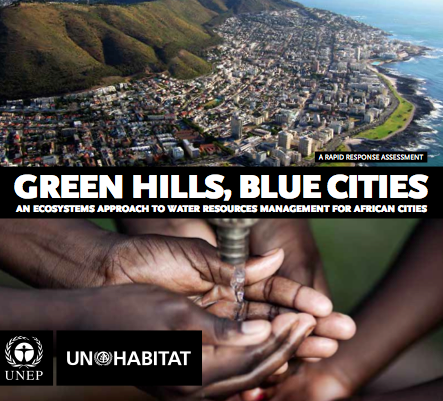As part of World Water Day 2011, the UN Environment Programme (UNEP) and the UN Human Settlements Programme (UN-HABITAT) launched a Rapid Response Assessment report titled "Green Hills, Blue Cities: An Ecosystem Approach to Water Resources Management for African Cities."
 21 March 2011: As part of World Water Day 2011, the UN Environment Programme (UNEP) and the UN Human Settlements Programme (UN-HABITAT) have launched a Rapid Response Assessment report titled “Green Hills, Blue Cities: An Ecosystem Approach to Water Resources Management for African Cities.”
21 March 2011: As part of World Water Day 2011, the UN Environment Programme (UNEP) and the UN Human Settlements Programme (UN-HABITAT) have launched a Rapid Response Assessment report titled “Green Hills, Blue Cities: An Ecosystem Approach to Water Resources Management for African Cities.”
According to the report, rapid urbanization is changing Africa’s landscape and challenging its water and sanitation services. It estimates that Africa’s urban population without access to safe drinking water increased from 30 million in 1990 to 55 million in 2008, while the number of people without adequate sanitation facilities doubled to around 175 million.
UNEP Executive Director Achim Steiner highlighted elements of the report that need to be addressed in countries’ preparations for the UN Conference on Sustainable Development (UNCSD, or Rio+20). He cited research on transitioning to a green economy – one of the two themes of the UNCSD – showing that policies redirecting approximately 0.1% of global gross domestic product (GDP) per year “can assist in not only addressing the sanitation challenge but conserve freshwater by reducing water demand by a fifth over the coming decades compared to projected trends.” UN-HABITAT Executive Director Joan Clos noted that, as cities expand, universal access to water and basic services need to be guaranteed, while ensuring that cities become more resilient to climate change effects.
The report provides case studies of cities where high urbanization rates are not matched with adequate water and sanitation infrastructure, including detailed cases from Addis Ababa, Ethiopia; Grahamstown, South Africa; and Nairobi, Kenya.
The report indicates that solutions and policy interventions should: acknowledge and support the role of the private sector in complementing government and municipal authorities in delivering water and sanitation services, especially to poor urban areas; take into account the generally high levels of income poverty in Africa by acknowledging that market-based approaches are not always the best option to supplying water in urban areas in a sustainable way; inform residents of links between forests, protected areas and water supply; demonstrate that it pays to protect watersheds instead of building expensive water purification systems; raise awareness of the impact of poor water quality on health, the economy and the environment; and “mainstream the environment” into urban water management, through approaches such as Payments for Ecosystems Services, Integrated Water Resources Management, and Water Demand Management. [UNEP News Centre] [Publication: A Rapid Response Assessment – Green Hills, Blue Cities: An Ecosystem Approach to Water Resources Management for African Cities] [Joint Statement of Steiner and Clos]